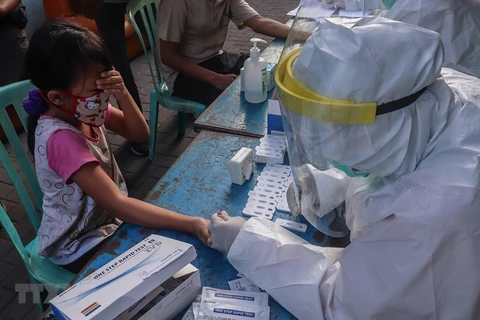Jakarta (VNA) – The Indonesian government is rolling out a 641.17 trillion rupiah (43 billion USD) economic recovery stimulus, bigger than previous allocations, to soften the impact of COVID-19 on micro, small and medium enterprises (MSMEs), as well as state-owned enterprises (SOEs).
Finance Minister Sri Mulyani Indrawati said the “national economic recovery” programme will include a strengthened social welfare net, tax incentives, capital injections into SOEs and interest rate subsidies for MSMEs, among other measures.
The government will accelerate spending to help MSMEs and SOEs, apart from a consumer spending stimulus and tax incentives for industry, Sri Mulyani said during a press conference. These efforts aim to stimulate the supply and demand for economic recovery, she noted.
The government will revise again the 2020 state budget to accommodate the stimulus as it expects the budget deficit to further increase to 6.27 percent of the country’s GDP, larger than the initial plan of a deficit amounting to 5.07 percent of GDP.
Sri Mulyani said the widening budget deficit was warranted as government revenues may drop by 69.3 trillion rupiah to 1.69 quadrillion rupiah, while the government boosts state spending by 106 trillion rupiah to 2.72 quadrillion rupiah.
State income will drop as a result of bigger tax incentives and weakening economic sectors and commodity prices, the Finance Minister told reporters. Meanwhile, state spending will be boosted to strengthen the economy against the COVID-19 pressures, she added.
Indonesia is planning a 149.29 trillion rupiah bailout for 12 SOEs, mostly as cash compensation and working capital investments, to reduce the impact of the coronavirus crisis. The funding includes 48 trillion rupiah in compensation for electricity firm PLN, 45 trillion rupiah in compensation for oil company Pertamina and 8.5 trillion rupiah in working capital for flag carrier Garuda Indonesia.
The country will also provide 34.15 trillion rupiah worth of loan repayment subsidies for around 60 million borrowers to cope with the pandemic. A total of 87.59 trillion rupiah will also be allocated for banks to support their loan-restructuring programmes.
It is also planning to provide 172.1 trillion rupiah for the social welfare net, far higher than the previous plan of 110 trillion rupiah, as well as increasing its tax incentives program to 123 trillion rupiah from the initial plan of 70.1 trillion rupiah./.
VNA
























